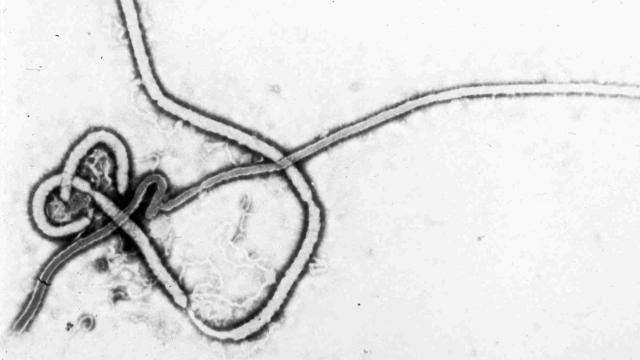An American medical worker in Africa may have had too close a brush with the deadly Ebola virus that is currently devastating the Democratic Republic of Congo. He returned to the U.S. and is now at a hospital in Nebraska, where doctors are keeping a close eye on him.
On Saturday, the University of Nebraska Medical Center announced that it would be monitoring an American who was possibly exposed to the virus while providing medical assistance in the DRC. The man has since been flown to the center in Omaha and is being carefully watched for any emerging symptoms. So far, NPR reports, he doesn’t appear to be in any danger.
“This person may have been exposed to the virus but is not ill and is not contagious,” Ted Cieslak, an infectious diseases specialist with Nebraska Medicine and associate professor of epidemiology in the University of Nebraska Medical Center College of Public Health, said in a statement. “Should any symptoms develop, the Nebraska Medicine/UNMC team is among the most qualified in the world to deal with them.”
Ebola isn’t contagious until after symptoms appear, which can initially include high fever and muscle pain and later profuse bleeding and vomiting. Symptoms can take anywhere from two days to several weeks to appear, and the man will be monitored for up to two weeks. For now, the man technically isn’t a patient, but if he does become sick, he’ll be transferred to the center’s Biocontainment Unit. At that point, UNMC has said, it will begin to provide regular updates on his condition.
This wouldn’t be the first encounter UNMC has had with Ebola. During the most widespread Ebola outbreak to date, which sickened nearly 30,000 people and killed over 11,000 between 2014 to 2016, doctors at the center treated and monitored several people who had contracted or been exposed to the disease. And the state is one of the few to have a dedicated biocontainment unit.
It should go without saying that the man isn’t considered a risk to anyone else’s health in the U.S., if not for the fact that plenty of people and even government officials collectively panicked the last time the virus made it to the States.
The current outbreak in the DRC isn’t as far-reaching as the 2014 outbreak, which mostly affected West Africa, but it’s already become the second largest outbreak in the known history of the virus. According to the World Health Organisation, at least 591 people are suspected or confirmed to have come down with Ebola, while at least 357 have died as a result. And despite the greater availability of a experimental vaccine and experimental drugs during this outbreak, outside factors have aided its spread.
Much of the DRC is embroiled in violence, with constant conflict between rebel militias and the government. That’s made it hard for health care workers to track potential chains of transmission, vaccinate people at risk, and reach patients in time to treat them (most recently, a conflict between protesters and government troops led to patients and staff fleeing a government health center in Beni). The U.S. has, to much criticism from public health experts, pulled back its government medical personnel from the DRC, citing security risks over the violence.
While the World Health Organisation reports there are signs that the latest wave of cases has begun to die down in some areas, there’s also still the chance the outbreak may spread elsewhere, even beyond the borders of the DRC.
